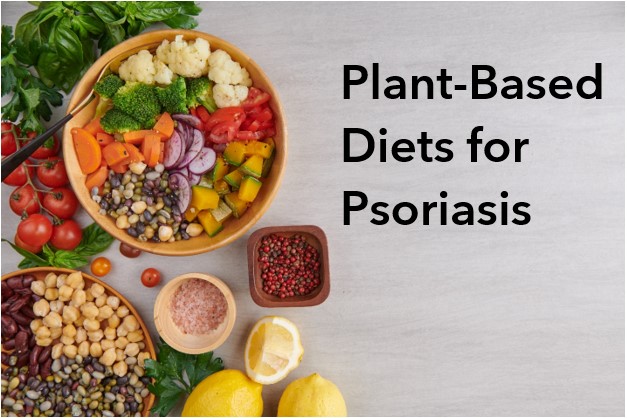
I received such great feedback from my collaboration with Vegnews on a the benefits of a plant-based diet for psoriasis I thought I would expand on this topic.
What is Psoriasis?
First off, what exactly is Psoriasis? Psoriasis is an immune mediated disease, meaning that the exact cause of this disease is unclear. What we do know is that it causes inflammation in the body which is generally characterized by raised plaques and/or scaly skin. The National Psoriasis Foundation estimates that psoriasis affects 3% of the adult U.S. population.
Current Treatments
Treatments for psoriasis can vary and include everything from pharmacology steroids, to light therapy to alternative treatments such as aloe Vera and fish oil supplements. The chronic inflammation of this disease is characterized by psoriatic lesions, resulting in oxidative stress. For those suffering with psoriasis the unpredictability of the disease can induce even more stress, triggering more psoriasis flare-ups.
While the internet is full of lots of helpful health information, regarding psoriasis, a 2019 research report estimated that nearly two-thirds of YouTube videos on psoriasis disseminate misleading or even dangerous content. Always consult your doctor or medical professional before making health changes. Registered dietitians are credentialed and licensed by state to provide you with expert nutrition recommendations.
Plant-Based Diet Effect on Psoriasis
Now, back to psoriasis inflammation and how plants can help! As with all nutrition recommendations I go to the research. At the foundational level, a diet for inflammation should be anti-inflammatory focused. This is where a plant-based diet comes in.
Plant foods are rich in antioxidants and phytochemicals. Antioxidants are substances that protect against harmful effects of free radicals. Phytochemicals, also referred to as phytonutrients are chemicals found in plants, fruits, vegetables, whole grains, legumes, beans, nuts, herbs and spices that have the potential to stimulate the immune system, reduce inflammation and reduce oxidative damage to cells. Research shows that a diet rich in vitamin C, Beta-carotene and flavanoids helps to improve psoriatic skin lesions. Keep in mind many of these antioxidant nutrients are found in skincare products and oral supplements, however the best way to get the benefits of these nutrients is through food sources.
Key Nutrients for anti-inflammatory benefits:
Vitamin C: Vitamin C is an antioxidant and helps with collagen formation, a key structural component of our skin.
Sources: Broccoli, kiwi, strawberries, bell peppers, tomatoes
Vitamin E: This antioxidant is found in our skin oil and helps create a natural barrier to keep moisture in our skin and helps reduce skin’s inflammatory response.
Sources: Nuts, seeds, avocado, legumes
Omega-3: These polyunsaturated fatty acids have been suspected to have anti-psoriatic effects.
Sources: Walnuts, flaxseed, salmon, mackerel
Flavanoids: These plant compounds have been shown to have anti-inflammatory effects in the body.
Sources: Berries, onions, kale, cabbage, tea, parsley, citrus fruits
Dietary Fiber and short-chain fatty acids: Short-chain-fatty-acids are the by-products of fiber fermentation in the colon. They help to regulate inflammation in the intestines and have been shown to improve psoriasis.
Sources: Most SCFAS are made in the gut when following a plant-based diet. Sources include high fiber fruits and vegetables: garlic, onions, peas, lentils, bananas, apples, carrots. The list goes on!
Foods to Avoid:
Studies have shown that certain foods can promote the inflammatory response in the body and worsen skin disorders, such as psoriasis. Foods that promote inflammation include saturated fats such as those in red meat. Of course, if you are eating a plant-based diet red meat is not of concern. However, simple sugars have been shown to exacerbate psoriasis. So, avoiding excessive intake of simple sugars and simple carbohydrates is recommended.
Research shows that alcohol and smoking can exacerbate the symptoms of psoriasis and should be avoided when possible to reduce symptoms. Psychological stress is also a risk factor for psoriasis and dealing with psoriasis also causes stress, so this is a cycle that makes dealing with psoriasis very difficult.
Thrive RDN Final Thoughts:
Replacing processed foods, simple carbohydrates and simple sugars with vegetables, fruits, nuts, seeds, and legumes will help support healthy skin and help to ease the inflammation associated with psoriasis. A diet that is rich in antioxidants and plant-focused can help in providing relief to those dealing with psoriasis.
Interested in seeing how a plant-focused diet can help with your psoriasis? Contact Amy or schedule a free 15-minute consultation today.
References:
Garbicz, J., Całyniuk, B., Górski, M., Buczkowska, M., Piecuch, M., Kulik, A., & Rozentryt, P. (2021). Nutritional Therapy in Persons Suffering from Psoriasis. Nutrients, 14(1), 119. https://doi.org/10.3390/nu14010119
Kanda, N., Hoashi, T., & Saeki, H. (2020). Nutrition and Psoriasis. International Journal of Molecular Sciences, 21(15), 5405. https://doi.org/10.3390/ijms21155405
Musumeci, M. L., Nasca, M. R., Boscaglia, S., & Micali, G. (2022). The role of lifestyle and nutrition in psoriasis: Current status of knowledge and interventions. Dermatologic Therapy, 35(9), e15685. https://doi.org/10.1111/dth.15685
Phytochemicals’ Role in Good Health. (n.d.). Retrieved September 14, 2022, from https://www.todaysdietitian.com/newarchives/090313p70.shtml
Staff, E. (2020, September 21). Food for Healthy Skin. Tufts Health & Nutrition Letter. https://www.nutritionletter.tufts.edu/healthy-eating/food-for-healthy-skin/